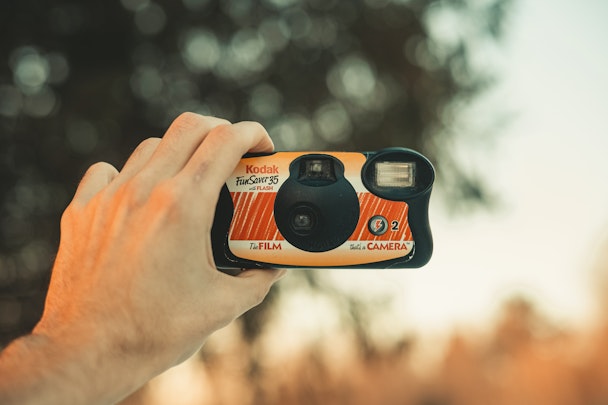The Y2K trend is here to stay – and it’s easy to see why
Y2K isn’t the first trend to return to the masses, but is it back for the long haul? Bonnie O’Hara of Amplify explores how the possible fear of what’s ahead has us looking backward.

Y2K styles (and even attitudes) are making a comeback. Here, agency Amplify tells us why. / Mark Bishop via Unsplash
As the year 2000 approached, Y2K was clouded with the doom of a millennium bug. The world was scared that our computers and clocks would suddenly stop because of calendar formatting errors. Thankfully, none of that happened – and it caused global euphoria.
Fast forward to 2023 and we really have experienced a global catastrophe, with the shared experience of the pandemic thrusting us into a Y2K mindset. It’s no wonder that the styles of the era are resurfacing. People are seeking an idealized version of the past, fueled by a love of fashion and noughties pop culture.
The Y2K fashion trend has seen a massive explosion among gen Z, while also being a nostalgic trend for millennials who witnessed it firsthand last time. On TikTok, you’ll see thousands of videos on Y2K outfit ideas, Y2K aesthetics, and the sounds of Y2K.
Advertisement
Reviving the old aesthetic
Gen Z is looking to second-hand and vintage stores as well as platforms like Depop, Ebay and Vinted. Emerging fashion brands like Isabella Vrana are embracing this appetite, with its 90s- and 00s-inspired womenswear and a modern focus on conscious consumption. Meanwhile Diesel, whose jeans were a fashion staple in 2000, have made a comeback. Embracing gen Z’s love for low-rise, metallic styles and grunge looks, Diesel looked into its archives and brought out a collection seen as the aesthetic for the future.
We’re also seeing a return of the girl group, with British trio Flo hosting a Y2K pop-up for the launch of The Fly Girl Pop-Up Salon offering slushies, nail art and tooth gems. In Mahalia and Jojo’s music video for the song Cheat, the pair danced around their brightly decorated bedrooms with spiky buns, glossy lips, and fish-eye camera shots. We’ve also seen a resurgence of old favorites, with the Sugababes on tour and partnering with dance music brand Boiler Room.
Or take ‘fashion dolls’ Bratz: first launched in 2001, and now partnering with next-gen fashion label Mowalola. The limited-edition dolls represent the innovative, youthful, and fashion-forward nature of both brands.
Even the recent focus on Barbie is through a Y2K lens. The Barbie Aldo collection fulfills dolled-up dreams, embracing pink, glam, and Y2K with rhinestone-emblazoned designs and metallic hues.
From velour track pants to wired headphones, some items have reemerged because of the people who loved them the first time around; others came to the fore with a distinct gen Z spin. The message? We want to escape the changing world and seek out more comfortable territories.
Return of the Y2K icons
Klarna’s 2022 trend report declared ‘nostalgia’ the moment’s key trend, and Klarna’s own House of Y2K showcased the evolution of shopping through the power of ‘Nowstalgia’. The brand’s partnership with Paris Hilton saw a range of her iconic 2000s looks go on display.
MSCHF, meanwhile, has partnered with Crocs to release a second version of the Big Red Boot. Again enlisting Paris Hilton as the face of the campaign, the yellow shoe quickly gained a cult following, being sold on the StockX market for between $1,000 and $5,000. MSCHF continues to operate as a case study for hype culture, their latest drop reiterating the importance of attention.
Advertisement
Reconstructing the past
Y2K isn’t the first trend to return to the masses; most things work in a cyclical nature. Does the focus on Y2K (and nostalgia as a whole) stem from an existential crisis?
We’re living post-Covid, dealing with a cost-of-living crisis, and trying to understand the progression of AI. Out of fear of what’s ahead, we’re looking backward, reinventing our past, to manufacture the future.
The 2000s is also, of course, the era of 9/11 and the Iraq war. Are we idealizing a past that never was? Maybe, but we’re also tapping into a need for joy and humor in difficult times. We’re taking the best of 2000 parties and channeling their optimism, even if we’re ignoring the reality.
Suggested newsletters for you
Experiential marketing’s Y2K moment
There’s an interesting opportunity here for experiential, as we look for original ways to connect with an audience and drive hype around a moment. Whether we look at Disney x Marvel’s Quantum Cafes popping up on pavements, or Jennifer Lawrence on a promotional run for her new film No Hard Feelings including a visit to Sean Evans’ YouTube show Hot Ones, it’s all rooted in the desire for an audience to become closer to the world they spectate.
Brands that once merely held up a mirror to themselves, dictating what’s on trend, are now looking to their consumers for inspiration, constructing a world around their tastes, interests and values. The audience is dictating the marketing landscape more than ever, so for as long as they embrace Y2K it will be in our brand campaigns, product launches and brand activations.
It’s no surprise that gen Z is reveling in the more analog (and arguably carefree) era of Y2K, with millennials and gen X paving the way. As new subcultures emerge fueled by collective creative expression, we could see the generation become increasingly driven by the threat of climate change, global tensions, and the cost-of-living crisis. Perhaps then, the Y2K bubble will burst yet again.
Content by The Drum Network member:

Amplify
We solve problems.
At the heart of any problem is a person. A real person. What they think, believe, want or need. We help brands to connect with them and...

